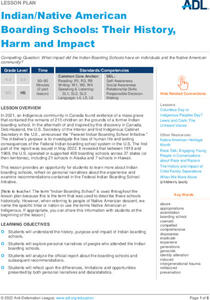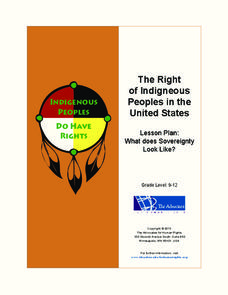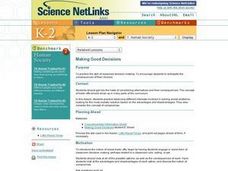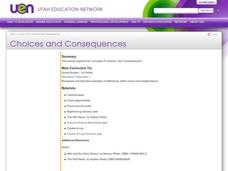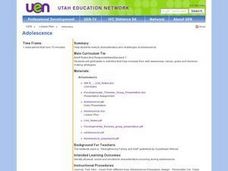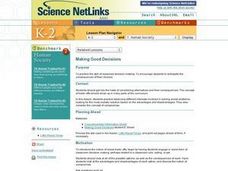Museum of Disability
Zoom!
Turn your class' focus on how wheelchairs assist individuals with disabilities to become more independent with this disabilities lesson plan. Scholars listen to a read aloud of the book, Zoom! by Robert Munsch, answer questions about key...
Anti-Defamation League
Is Gaming a Boy's Club? Women, Video Games and Sexism
High school juniors and seniors investigate the representation of women in video games. They watch a video of researcher Anita Sarkeesian who describes the response to her research attempts, and read articles related to the topic. To...
Facing History and Ourselves
Blending In and Standing Out
An excerpt from Sarfraz Manzoor's memoir about how his experiences as a Pakistani growing up in England shaped the way he though about his identify provides a stimulus for a discussion of how experiences can shape our concept of identity...
Facing History and Ourselves
Defining Our Obligations to Others
Introduce young learners to the concept of a Universe of Obligation, a term coined by sociologist Helen Fein, with a lesson that asks learners to consider the extent to which they feel a responsibility for others. Class members read and...
Anti-Defamation League
Indian/Native American Boarding Schools: Their History, Harm and Impact
Encultureate, assimilate, or eliminate? The 2021 discovery of a mass grave of over 200 children on the site of a former Canadian Indian Boarding school led to the creation of the Federal Indian Boarding School Initiative. High schoolers...
Anti-Defamation League
Emojis and Me
A instructional activity features the work of O'Plérou Grebet, a graphic designer who created a collection of emojis to represent his life in West Africa. Scholars explore the history and purpose of emojis, then read and discuss an...
Anti-Defamation League
What are Reparations and Should We Enact Them?
Young social scientists investigate recent legislative proposals for reparations for African Americans. They examine the rationale behind the proposals by viewing videos and reading related articles. To close the instructional activity,...
Bierbaum Elementary School
Practicing Patience
As teachers, we have a lot of patience. Our scholars, on the other hand, may need some support. Give your pupils the emotional intelligence instruction they desire with a lesson designed to teach patience through grand conversation,...
Curated OER
A Similar Look at Another Text
Second graders read stories about relationships and record their thoughts using a "Before" and "After" organizer.
Education Bureau of Hong Kong
Evaluating Casual Claims
Responsible decision making relies on the ability to a recognize, analyze, and evaluate claims. The worksheets and activities in this 32-page packet teach learners how to distinguish among opinions, reasoned arguments, facts, and logical...
Advocates for Human Rights
The Right of Indigneous Peoples in the United States
The sovereignty of U.S. Native American nations is the focus of a resource that asks class members to compare the Right to Self-Determination in the UN Declaration on the Rights of Indigenous Peoples with a fact sheet that details the...
Facing History and Ourselves
The Costs and Benefits of Belonging
Peer pressure and the desire for acceptance are powerful things. A thought-provoking lesson looks at the positive and negative effects of wanting to belong to a group. Class members examine the roles of the perpetrator, the victim, the...
Education Foundation of Sarasota County
Self-Calming Strategies to Manage Emotions
Tweens and teens learn coping skills to help manage strong emotions such as anger, fear, and sadness with a lesson plan that asks them to generate a list of self-calming strategies they use and to consider the suggestions in a short...
Curated OER
Making Good Decisions
Students explore the decision-making process. In this citizenship lesson, students read the book, A Hill Too High to Climb and discuss the decisions the characters had to make in the story. Students discuss how the characters' actions...
Curated OER
1st Grade - Act. 09: Freedom Quilt
First graders create sections of classroom quilt that be tied together.
Curated OER
Decision Making and Assertiveness
Fourth graders identify a problem and write a persuasive essay to the appropriate audience, to correct the problem. They demonstrate effective decision making based on positive self-worth. Students need to write a paragraph about their...
Curated OER
Choices and Consequences
First graders explore the relationships between the choices one makes and the consequences that follow. The importance of choices in context of getting along with others is stressed throughout the instructional activity.
Curated OER
Social Studies: Adolescent Characteristics
Students examine the various characteristics of adolescence. In a Powerpoint presentation they observe the physical, emotional, and social traits of adolescence. In groups, they investigate researchers associated with developmental...
Curated OER
Making Good Decisions
Students consider alternative decisions and consequences. In this decision making lesson, students role-play in a social problem. They look for a realistic solution based on advantages and disadvantages.
Museum of Tolerance
Essential Vocabulary and Concepts
Genocide. Scapegoat. Propaganda. Words are powerful. Words carry the weight of history. To prepare for a visit to The Museum of Tolerance, class members consider the weight of meaning in words related to intolerance.
Curated OER
2nd Grade - Act. 07: What Makes a Good Family?
Second graders discuss what makes a good family.
Curated OER
I Grow
Students describe factors that influence relationships with family and friends. They write a book about themselves using personal knowledge.
Curated OER
Making Good Decisions
Students analyze the consequences that result from their choices. In this good decision-making lesson, students listen to an article in the "Little Planet Times" and complete the associated worksheet. They participate in a role play in...
Curated OER
Making Good Decisions
Students practice balancing different interests involved in solving social problems, looking for the most realistic solution based on the advantages and disadvantages. They also consider the concept of compromise.






